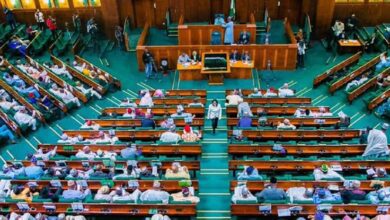Food Security: FG To Establish Commodity Board To Tackle Price Volatility, Others

The Federal Government has disclosed plans to establish a National Commodity Board as a way of tackling the rising food inflation in the country.
Vice President Kashim Shettima disclosed this on Tuesday during a two-day high-level strategic meeting on climate change, food systems, and resource mobilisation held at the Banquet Hall of the Presidential Villa, Abuja.
He noted that in tackling price volatility, the board will be given the mandate to assess and regulate food prices, as well as maintain a strategic food reserve for stabilising prices of crucial grains and other food items.
The Senior Special Assistant to the President on Media and Communications, Stanley Nkwocha in a statement disclosed that while delivering his address titled, “Climate Resilience and Food Security: Nigeria’s Vision for the Future,” Senator Shettima said, the two-day event is an attestation of Nigeria’s efforts at mitigating the effects of climate change and ensuring food security for Nigerians.
Recalling that food security was one of the eight areas of priority declared by President Bola Ahmed Tinubu as part of his Renewed Hope Agenda, which led to the declaration of a state of emergency on food security, the VP highlighted ongoing policy reforms by the administration to ensure food and water availability, as well as affordability.
“Our solution to the potential food crisis has become immediate, medium, and long-term strategies. The short-term strategy entails revitalizing the food supply through specific interventions like the distribution of fertilizers and grains to farmers and households to counteract the effects of subsidy removal; fostering collaboration between the Ministry of Agriculture and the Ministry of Water Resources for efficient farmland irrigation, ensuring year-round food production, and addressing price volatility by establishing a National Commodity Board.
“This board will continually assess and regulate food prices, maintaining a strategic food reserve for stabilizing prices of crucial grains and other food items,” the VP stated.
He assured that while the Tinubu administration is fully invested in the restoration of degraded land, there are ongoing plans “to restore four million hectares, or nearly 10 million acres, of degraded lands within” the nation’s borders as its contribution to the AFR100 Initiative.
On how the government is handling the security challenges that have prevented farmers from working on their farms, he said, “I wish to assure you that we will engage our security architecture to protect the farms and the farmers so that farmers can return to the farmlands without fear of attacks.
“We won’t only make it safe for farmers to return to their farms, but we will also ensure the activation of land banks. There are currently 500,000 hectares of already mapped land that will be used to increase the availability of arable land for farming, which will immediately impact food output.”
VP Shettima added that the Tinubu administration is also collaborating “with mechanization companies to clear more forests and make them available for farming,” even as the Central Bank of Nigeria “will also continue to play a major role in funding the agricultural value chain.
“We will deploy concessionary capital to the sector, especially towards fertilizer, processing, mechanization, seeds, chemicals, equipment, feed, labour, among others. The concessionary funds will ensure food is always available and affordable, thereby having a direct impact on Nigeria’s Human Capital Index (HCI). This administration is focused on ensuring the HCI numbers, which currently rank as the 3rd lowest in the world, are improved for increased productivity,” he added.
Senator Shettima also restated frantic efforts by the administration “to ensure a massive boost in employment and job creation”, noting that it “is another presidential area of priority.
“The government will make agriculture attractive for our teeming youth population with a view to creating between 5 to 10 million more jobs for them within the agriculture value chain, working with the current 500,000 hectares of arable land and the several hundreds of thousands more farmlands to be developed in the medium term,” he pointed out.
These efforts, the VP continued, are part of the federal government’s bid to actualize the “UN-Agenda 2030 on Sustainable Development Goals 2 of “Zero Hunger” and African Union Agenda 2063, which aims to transform Africa into a global powerhouse of the future.
“But we can’t achieve this unless we guarantee food security by building the capacity of smallholder farmers who account for about 88% of the total food production in Nigeria,” he further noted.
He implored those at the event, including development partners, private investors, and the diplomatic community, among others, to make sure the high-level engagement results in a positive outcome.
Also speaking at the event, the National Coordinator of NEPAD, Mrs Gloria Akobundu, praised President Tinubu for his efforts towards making Nigeria a great nation.
“We are happy with the resolve by the administration of President Bola Tinubu to stand undeterred by any odds in his objective to build a viable, effective, and great nation,” she said.

Mrs. Akobundu said NEPAD decided to convene the stakeholders’ forum in order to strengthen smallholder farmers in Nigeria as a way of addressing the food shortage problem in the country.
“We have gathered key stakeholders from across Nigeria and all over the world to commence the resource mobilization conversation for smallholder farmers in Nigeria and Africa and emphasize the urgency of action required in the face of the current and growing food crisis,” she added.
On his part, AU Chairman of Food System, Dr Ibrahim Maiyaki, said the challenges that will confront Africa in the next 20 to 30 years could be tackled through three parameters: the continent’s know-how, expertise, and leadership.
“The demographic challenge the continent is facing can be turned into opportunities for Africa through inclusion, job creation, and ability to feed Africa and the rest of the world,” he stated.
Maiyaki called for strong regional integration through food transformation as well as boosting productivity and economic growth rates through the right policies and governance objectives.
Other dignitaries who attended the opening ceremony of the high-level engagement include the Chairman, Senate Committee on Cooperation and Integration in Africa, Senator Nasiru Sani Zangondaura; Chairman, Senate Committee on Information and National Orientation, Senator Eze Kenneth Emeka; representatives of the Governors of Bauchi, Edo, Delta and Plateau States, as well as members of the Diplomatic Corps.






